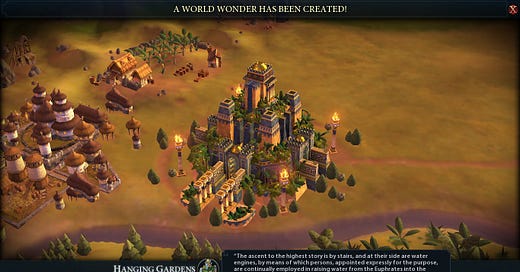On Towards the Stars: Strategic Races
Building your Civ 6 strategy around limited, globally accessible assets
[This post is part of a larger strategy guide for Civilization 6]
Although Civ takes inspiration from history simulators, it is still a game. It wants players to interact and create emergent narratives from conflicts between them as they vie for victory. One form of interaction is war, another is trade. Both of these are 1:1, and often context specific. We'll spend lots of time talking about both of those later. For now, I want to focus on a third form of player-to-player interaction: the race.
The anatomy of a race is simple. There is a goal or reward gated behind some condition or resource expenditure requirement. Each turn, you can make progress towards that goal or reward. If you manage to achieve the condition, you get the reward. And, crucially, there is not enough reward for everyone in the game to win.
Races are all over civ:
Each pantheon can only be selected once, so if your strategy hinges around a specific pantheon you have to rush to get it.
There are always N/2 religions in the game. If you want a religion, you'll have to beat at least half the other players.
Each wonder can only exist once in the world, so every wonder ends up being a race to completion.
Each great person can only be earned once. Great Engineers, Merchants, and Scientists often have highly unique special abilities that may synergize well with your specific civ, meaning you have to work to recruit them before everyone else.
Certain diplomatic events — such as the world's fair, the world games, aid requests, and more — are ranked competitions, with the first place winner getting rewards and diplomatic victory points.
The entire science victory condition is explicitly a race! The first person to the exoplanet wins.
Races in civ are a fantastic piece of game design. The game designers wanted to have a mechanism by which players can influence each other from far across the map, from the earliest parts of the game, even when playing a primarily peace-focused strategy. The answer is to limit assets, so that only a few people in the game can access them. This way, when people attempt to get those assets — to win the race — they directly impact everyone else.
Or, to put it a slightly different way, the outcome of each race is an opportunity for you to ruin someone else's strategy, or for someone else to ruin yours.
As a result, you need to pay special attention to pieces of your strategy that depend heavily on race outcomes. This may sound obvious, but if you know you have to depend on a race — e.g. you are playing as Byzantium and need a religion — you should put resources in to win!
Now, obviously, not all strategies require entering a race to begin with. You can build a pretty strong powerhouse without ever relying on the outcome of a race. But races provide valuable resources to the winners, so they might be what you need to either stay ahead or catapult ahead of your opponents. If you have the option to enter a race it's worth considering what the likelihood is of winning. For example, if Arabia (gets a free Great Prophet) or Russia and Japan (have half-price Holy Sites) are in the game, you may want to reconsider investing in getting a religion — you probably won't win. But if you know you're the only person in the medieval era, you can pretty confidently invest in building medieval wonders like Kilwa Kisiwani.
Note that this is part of the reason why information collection is so vital. If you know what your opponents are working on, you can guess whether they will successfully out-compete you on different kinds of races.We'll talk more about specific races and how to win them in the tactics sections of this guide.




